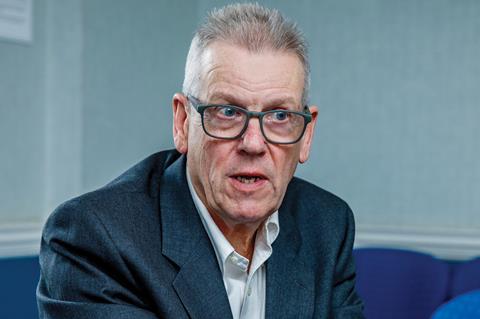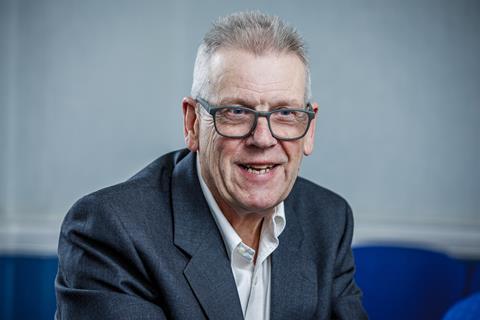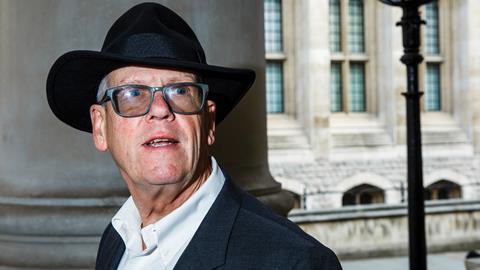Solicitor Walter Merricks CBE has been catapulted into the headlines by his record-breaking class action against Mastercard. But this is only the latest episode in a 50-year career spent fighting for fundamental rights, hears Jonathan Rayner
BioG
EDUCATION
Law degree, Trinity College, Oxford
CAREER HIGHLIGHTS
Articles, Batt Holden, Wimbledon (1970)
Director of Camden Community Law Centre (1972-75)
Law lecturer, Brunel University (1975-83)
Member, Royal Commission on Criminal Procedure (1978-81)
Assistant general secretary, Law Society (1985-96)
Chief ombudsman, Financial Ombudsman Service (1999)
Commissioner, Gambling Commission (2012-17)
Chair of the board, Impress (2014-)
KNOWN FOR
Inaugural director of the UK’s first publicly funded law centre; first chief ombudsman of the Financial Ombudsman Service; first chair of Impress; heading the biggest class action in British history, against Mastercard
Walter Merricks, 73, has been thrust into the limelight by the £14bn class action he is coordinating against Mastercard. The case has captured the nation’s attention because, according to Merricks, its success should entitle every UK adult to a £300 rebate – whether or not they own or have ever owned a Mastercard.
In fact, Merricks is very comfortable in the public eye. He is chair of Impress, the press regulator that embodies Lord Justice Leveson’s recommendations following the Leveson inquiry into phone hacking and other crimes carried out by certain newspapers. It was this inquiry that led to the demise of the News of the World and to the jailing of several journalists.
The roll-call of Merricks’ achievements in public service is long. He was the inaugural chief ombudsman of the Financial Ombudsman Service. He sat on a Royal Commission and he is still on the executive board of Justice, the group formed more than 60 years ago to promote the rule of law and the fair administration of justice.
He was founding director of Camden Community Law Centre, the UK’s first publicly funded law centre, and a lecturer in law at Brunel University, where he focused on the law as it applied to ordinary citizens. And he was a freelance journalist on the New Law Journal, in which role he examined – and often criticised – the conduct of the Home Office, Lord Chancellor’s Department, the Law Society of England and Wales, and the Bar Council.
We inherited a system that assumes disputes have to go before bewigged judges with counsel on both sides to cross‑examine
In yet another former life he was also policy and communications director, and assistant secretary general, of the Law Society.
This wide-ranging experience has led Merricks to be frequently outspoken about the role of lawyers, telling the Gazette, for example: ‘Lawyers should swear to their own version of the Hippocratic Oath and promise to do all in their power to improve justice for everybody.’
Is there a common theme underlying Merricks’ eclectic 50-year career in the law? ‘The unifying thread,’ he replies, ‘is dissatisfaction with the legal system and the way justice is delivered. Our legal system is not designed for the layperson and has never been intended to allow access to justice to help people resolve ordinary, everyday issues.
‘We inherited a system that assumes disputes have to go before bewigged judges with counsel on both sides to cross-examine. That costs money and is intimidating and baffling. It has never been fit for purpose.’
Farmhouse to courthouse
Merricks is a farmer’s son from near the East Sussex town of Rye and was educated at Bradfield College, Berkshire. He read law at Trinity College, Oxford, graduating in 1967, before moving on to the Lancaster Gate campus of the College of Law (now University of Law). It was there that he began to learn the essence of practising law prior to becoming articled.
‘Back in those days, the Law Society ran a registry of firms looking for articled clerks and of people looking for articled clerkships,’ recounts Merricks. ‘I was teamed up with Batt Holden, a firm in Wimbledon, southwest London, where I was an articled clerk. That was the beginning of my career.’

He qualified in 1970 and applied for and was awarded a Hubbard Scholarship. This is a travelling scholarship open to qualified and practising solicitors in England and Wales which, to this day, offers a year’s funded study in Canada, France or Spain.
Merricks opted for Canada: ‘Crucially for my future career, I wound up working for one of the first legal clinics in Montreal. This was a totally innovative idea following on from US President Johnson’s war on poverty [a 1960s social welfare legislative programme aimed at ending poverty in the US] and, for the first time, enabled neighbourhood law firms to challenge government and big business interests.’
Returning to the UK, he became aware that the notion of law for those with low incomes – as well as the wealthy – was alien.
‘The Legal Action Group [which promotes equal access to justice for socially, economically or otherwise disadvantaged members of society] was just being founded in 1972,’ he recalls. ‘The Law Society was administering the legal aid scheme, with local solicitors sitting on committees to allocate funding. Legal aid funding was very largely focused on divorce and there was nothing for tribunal cases, for example, or welfare benefits disputes.
‘There was also just the one law centre in London – North Kensington. When more came into being, I found myself one of the few people in the country who had ever actually worked in a law centre. I successfully applied to be the inaugural director of Camden Community Law Centre, the UK’s first publicly funded law centre.’ Merricks was just 26. ‘It was all very exciting and groundbreaking, setting up from scratch, employing staff and negotiating with the council for a grant.’
Exciting though it undoubtedly was, in 1975 an ‘exhausted’ Merricks decided to leave the law centre and teach students at Brunel University the type of law they would practise at a law centre.
‘You have to remember,’ he says, ‘that, for instance, land law in those days was all about landed estates. The law was no use for an ordinary person who was being thrown out of his home because the landlord wanted to gentrify it and charge more rent.’
Reforming the law
In 1978, while Merricks was still at Brunel University, he became a member of the Royal Commission on Criminal Procedure. This was chaired by historian Sir Cyril Philips and published its findings in 1981.
‘The commission was mostly focused on police powers and suspects’ rights,’ says Merricks. ‘The police were claiming that bent lawyers were in league with criminals, while civil liberties campaigners were accusing the police of planting evidence on alleged offenders.
‘It was a mess. Disclosure didn’t come into it and the police were strongly against the novel idea of taping interviews. One aspect of a suspect’s arrest was that anything he said had to be voluntary. And so the police would simply claim that the suspect had said he wanted to make a statement. Civil liberties organisations were opposed to voluntary statements. And a psychologist engaged by the commission concurred, stating that everything said or done while under arrest in the oppressive environment of a police station cannot be defined as “voluntary”.’
Mastercard battle

Today, Walter Merricks is best known for the £14bn class action against Mastercard. The case has its origins in a 2007 European Commission ruling that Mastercard breached competition law by inflating charges on card transactions over a 16-year period. The retailers passed on the cost of each transaction to consumers, with the effect that consumers suffered a financial detriment.
‘This is a clear breach of the Consumer Rights Act 2015, which ensures consumers have a remedy for such breaches,’ says Merricks.
Merricks calculated the total value of commerce in the UK during those years and was able to work out how much extra consumers were forced to pay. He divided this figure by 46.2m, which is how many adults there are in the UK, and calculated that each and every adult in the UK was owed £300.
In April, the Court of Appeal granted permission to appeal the Competition Appeal Tribunal’s decision to dismiss the case. At the time, Mastercard said it ‘continues to disagree fundamentally with the basis of the claim’.
Nonetheless, according to Merricks, this commission was the ‘most successful of the 20th century’. It led – among other achievements – to the enactment of the Police and Criminal Evidence Act 1984 and, in 1986, the creation of the Crown Prosecution Service. The latter is founded upon a clear demarcation of responsibility between the investigation and prosecution of alleged criminal offences. This was in stark contrast to the previous regime where, Merricks says, ‘prosecutors came from local authority bodies funded by the police and the police would also instruct the prosecutors’.
He left Brunel in 1983, armed with an impressive contacts list after his time on the Royal Commission, and until 1985 worked as a freelance legal journalist and broadcaster, principally writing a weekly column for the New Law Journal. In 1984 he was appointed a member of the Fraud Trials Committee chaired by Lord of Appeal, Lord Roskill. Its 1986 report led to the establishment of the Serious Fraud Office. While the majority of the committee recommended a judge-led Fraud Trials Tribunal to try serious fraud cases, Merricks wrote a note of dissent opposing the abolition of jury trial, saying: ‘It would be wrong to send someone to prison on a basis that couldn’t be understood by ordinary people sitting on a jury. Trials would turn into a battle of experts and would be won by whoever has the best expert.
‘The job of judges is to control trials so as to stop the defence baffling juries and the job of prosecutors is to reduce things to a comprehensible level. Cases of all sorts have been incompetently handled. Why single out fraud for special treatment?’
Reforming the trade
In 1985 he was appointed assistant secretary-general at the Law Society. ‘It was a torrid time for the Society,’ he recalls, ‘with all sorts of challenges to its authority. The Administration of Justice Act 1985 put an end to lawyers’ monopoly over the conveyancing process, for example, and there was also the scandal around a council member accused of overcharging a client who was acquitted by the Society, but struck off by the High Court.’
The Gazette was one of his responsibilities at the Society. ‘It published no real legal journalism in those days,’ he recalls. ‘It had a monopoly on job advertisements and so had an enormous income for doing very little. Editorial consisted of long articles like “Probate Revisited”, plus formal announcements and tribunal decisions. It’s a very different paper today.’
Merricks remained at the Society until 1996, when he became the UK’s Insurance Ombudsman. Three years later, the eight ombudsman schemes covering insurance, banking, building societies, personal investment and investment management were merged into the Financial Ombudsman Service. Merricks was appointed the first chief ombudsman to manage the merger and lead the new organisation, a post he held until 2009.
‘The ombudsman model is unique to the UK,’ states Merricks. ‘It revolves around the industry paying for dispute resolution in a service that is free to consumers. The ombudsman decides what is just, there are no hearings and the scheme runs almost exclusively without lawyers. Our experts can get to grips with the heart of the dispute by looking at both sides of the argument. They have already seen a thousand such cases before and can quickly spot the salient points. It’s faster and less costly than briefing a judge and going to court.’
A lawyer’s obligation should be to contribute time and money… to improve the delivery of justice for the common good
The ombudsman model part-inspired the way press regulator Impress, which Merricks chairs, is set up.
‘The imbalance in the justice system had hitherto allowed the media to wrongfully destroy someone’s reputation,’ says Merricks, ‘yet escape punishment because it can field huge teams of lawyers to counter the individual’s claim that he or she has been defamed.
‘Impress, like the ombudsman scheme, provides a simple arbitration scheme, for a modest fee or for free, to investigate breaches of the press code. The flip side, and this has proved highly controversial, is the penalty for not joining a regulatory organisation that offers arbitration. All such newspapers will not be able to recover any of their costs on the grounds that they refused to offer an inexpensive arbitration process to ordinary people who cannot afford legal fees.’
The News Media Association opposes Impress on the grounds that the penalties for not joining it threaten the freedom of the press and could bankrupt national and local newspapers. Instead it supports the Independent Press Standards Organisation (Ipso), which provides no access to arbitration and is sponsored, according to Merricks, by the ‘press barons’ that caused the hacking scandal in the first place. The Hacked Off campaign, which helped reveal the extent of phone hacking by newspapers, has dismissed Ipso as a ‘sham’.
Merricks concludes the interview with a plea to solicitors to rethink their place in society: ‘Many lawyers think it’s their job to work within the inadequacies of our flawed justice system and to help their clients navigate around them.
‘In fact, a lawyer’s obligation should be to contribute time and money to their local professional body or to a group like Justice with the one overriding objective: to improve the delivery of justice for the common good.’



















![David Lester (senior partner at Blythe Liggins), Darryl Barnes, Jagdeep Sandher (head of dispute resolution at Blythe Liggins)[4]](https://d1d8vslyhr7rdg.cloudfront.net/Pictures/274x183/4/2/8/116428_davidlesterseniorpartneratblytheligginsdarrylbarnesjagdeepsandherheadofdisputeresolutionatblytheliggins4_981603_crop.jpg)









1 Reader's comment